-
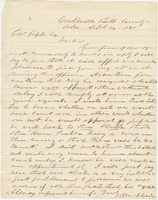
From the Alabama Department of Archives and History Governor A. B. Moore Collection. In the letter, McIlwain, described as the "only lawyer in Bibb," discusses a recently vacated judgeship, created by the incumbent Porter King joining the Confederate army, and if Governor Moore will agree to appoint someone else to the position.
-
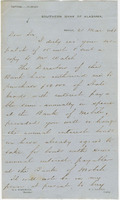
A letter from H.A. Schroeder as the president of the Southern Bank to Governor A.B. Moore with approval to purchase $50,000 in state bonds with interest payable in species to the Bank o Mobile upon past agreement. However, Schroeder will not be able to purchase anymore bonds.
-
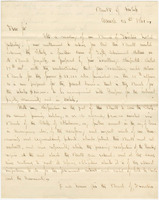
A letter from Southern Bank president Charles Walsh to Governor A.B. Moore about approval for $50,000 in bonds. Walsh cannot promise holdings in the state to Moore as Southern Bank already has $300,000 invested and must take care of those in his community for commercial and agriculture.
-
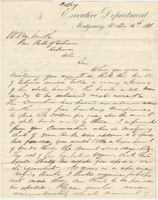
A letter from Governor A.B. Moore in Montgomery, Alabama to W.M. Smith in Selma, Alabama. Moore is discussing $20,000 in state bonds from the Montgomery Bank to be delievered in Selma the following week. He also recounts The Convention allowing free advertisments in cases of $2 upon one bond and is expecting one third of the payment in specie or equal with the expectation of daily correspondence.
-
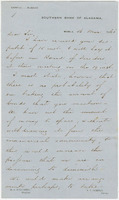
A letter from H.A. Schroeder as the president of the Southern Bank to Governor A.B. Moore in response to a past letter. Schroeder discusses having an issue with bonds as they do not have the proper funds requested by Moore. As the president he is requesting a different method to pay them off as interest rates payable to Montgomery are not possible.
-
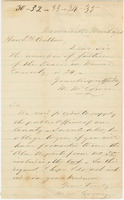
A letter from M. McCorvey in Monroeville, Alabama to P.H. Brittan discussing the number of judges in Monroe county. McCorvey also requests supplies for the public officers and Alabama reports.
-
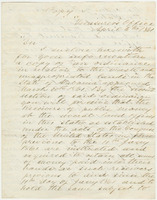
From the Alabama Department of Archives and History Governor A. B. Moore Collection. Transcribed copy of a letter from State Treasurer D. B. Graham to Thomas E. Herbert, a reveiver of public money in Greenville, Alabama. Graham requests financial statements for public funds in Herbert's possession on Alabama's date of secession, as well as public funds that Herbert received since that date.
-
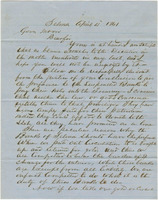
From the Alabama Department of Archives and History Governor A. B. Moore Collection. Letter from President W. M. Smith of Bank of Selma to Governor Moore, replying to previous letter. Smith contests Governor Moore's decision to grant privileges to certain Suspended Banks, prohibiting the Bank of Selma from buying state bonds using these Suspended Banks' notes.
-
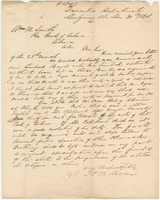
From the Alabama Department of Archives and History Governor A. B. Moore Collection. Transcribed copy of a letter from Governor Moore to President W. M. Smith of Bank of Selma. Reply to letter from Smith on March 28, 1861. Moore declines to use Commercial and Central Bank notes for payment of state bonds and responds to report of Mr. Copeland, assistant quartermaster, misappropriating state funds.
-
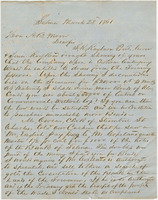
From the Alabama Department of Archives and History Governor A. B. Moore Collection. Letter from President W. M. Smith of Bank of Selma to Governor Moore. Smith describes Coosa & Tennessee Railroad treasury bill, inquires into purchasing more state bonds using Central or Commercial Bank notes, and reports Mr. Copeland, assistant quartermaster, for apparent misappropriation of state funds.
-
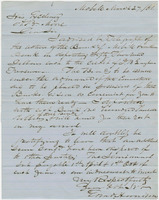
From the Alabama Department of Archives and History Governor A. B. Moore Collection. Letter from Colonel Edmund Harrison to Governor Moore detailing money and state bonds deposited in the Bank of Mobile and Southern Bank.
-
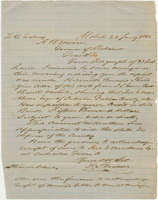
Letter written by David Stodder to Governor A.B. Moore regarding a $15,000 contribution from Joel Matthews. Funds were stated to be specifically used for the aid in the defense of the country.
-
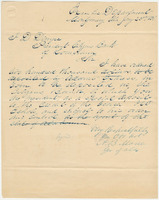
Letter written by A.B Moore concerning a $200,000 deposit into three different branches of the Citizens bank of Louisiana.
-
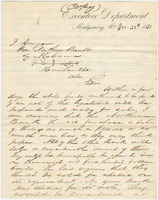
A letter written by A.B. Moore discussing bonds that are going to be issued and the laws and regulation behind the distribution of them.
-
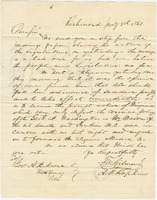
A letter to A.B. Moore encouraging Alabama to submit secession documents stating that the people of Richmond were for the cause of secession.
-
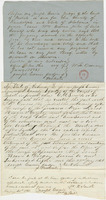
Affidavit written by Judge Joseph Currie and sworn by Mr. Owens jailor in Randolph County regarding the escape of prisoners Trent Weaver and Gregory.
-

William Kerr is writing to Governor Thomas H. Watts regarding the matter of impressment. Kerr is having difficulty with impressment and is asking the governor for help.
-

H.W. Cotter of the 28th Tennessee Regiment informing Governor Watts about young men who wish to enlist and is advocating for them to be transferred into Companies K and G.
-

In the letter, T. F. Samuel, the sheriff of Tuscalosoa County, wants to keep one deputy in the town as part of conscription exemptions. The Confederate Impressment Act now required that the governor approve the exemption of a deputy and Samuel notes he's getting "trouble" from "the military at this place."
-

Caspar Jones urgently writes to Governor Watts to convene the legislature in Alabama and command all men capable in the state to bear arms to assist in an emergency
-

T. M. Allison is questioning the authority of the impressment agents who are calling him to send enslaved men down to Mobile to support fortification building.
-

In the letter, Samuel Ruffin explains that, in the course of the Army retreating across the Tombigbee River, cavalry officers are impressing horses and mules for service. Ruffin threatens to arrest the first people that engage in impressment without authority.
-

Letter to Col David Green from Governor Watts clarifying exemption of men under the "agricultural clause" and instructing him to keep his command at West Point until further orders.
-

J.S. Sheffield asks the governor to send food to families of soldiers and destitute women and children in north Alabama.
-

In the letter, Mrs. Mathews writes to the Governor to get him to release her overseers who have been called up to the Militia. As she is a widow she fears rebellion from enslaved workers should she not have a competent and experienced overseer.

























